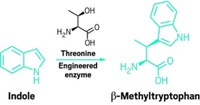Advertisement
Grab your lab coat. Let's get started
Welcome!
Welcome!
Create an account below to get 6 C&EN articles per month, receive newsletters and more - all free.
It seems this is your first time logging in online. Please enter the following information to continue.
As an ACS member you automatically get access to this site. All we need is few more details to create your reading experience.
Not you? Sign in with a different account.
Not you? Sign in with a different account.
ERROR 1
ERROR 1
ERROR 2
ERROR 2
ERROR 2
ERROR 2
ERROR 2
Password and Confirm password must match.
If you have an ACS member number, please enter it here so we can link this account to your membership. (optional)
ERROR 2
ACS values your privacy. By submitting your information, you are gaining access to C&EN and subscribing to our weekly newsletter. We use the information you provide to make your reading experience better, and we will never sell your data to third party members.
Synthesis
Plant Enzyme Accepts Unnatural Substrates
Chemists at MIT have introduced an engineered biosynthetic enzyme that uses a wider range of substrates to forge alkaloid analogs
by Celia Henry Arnaud
January 26, 2009
| A version of this story appeared in
Volume 87, Issue 4
Chemists at MIT have introduced an engineered biosynthetic enzyme that accepts a wider range of substrates into periwinkle plant culture to make unnatural analogs of alkaloids (Nat. Chem. Biol., DOI: 10.1038/nchembio.141). The enzyme that Sarah E. O’Connor and Weerawat Runguphan inserted into the plant cells is the strictosidine synthase from the periwinkle's monoterpene indole alkaloid pathway. This pathway produces a variety of alkaloids, and the ability to make unnatural analogs could lead to compounds with new or improved medicinal properties. However, the pathway is complicated and poorly characterized, making production of these alkaloids in microbial systems a challenge, which is why the MIT scientists opted to reengineer the plant itself. Strictosidine synthase, which synthesizes strictosidine from secologanin and tryptamine, is a key bottleneck in the production of unnatural alkaloids because of its stringent substrate specificity. O’Connor and Runguphan transformed a mutant enzyme that accepts substituted tryptamine analogs into periwinkle cell culture. The substituted strictosidine produced by the enzyme is used in subsequent reactions in the pathway to produce unnatural alkaloid analogs such as substituted tabersonine.




Join the conversation
Contact the reporter
Submit a Letter to the Editor for publication
Engage with us on Twitter